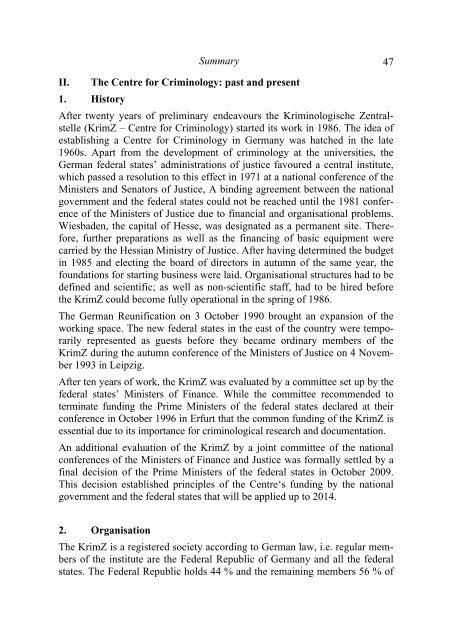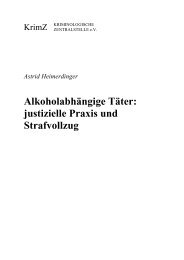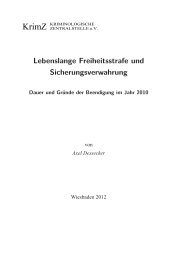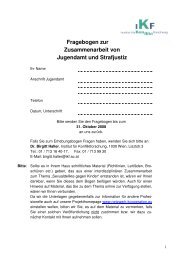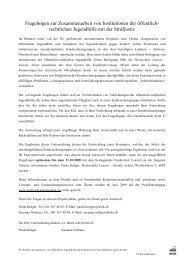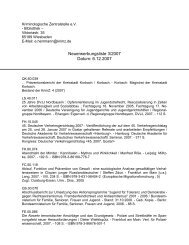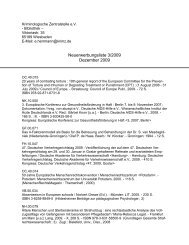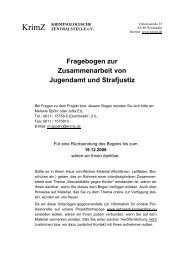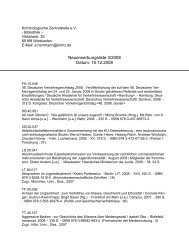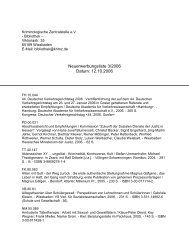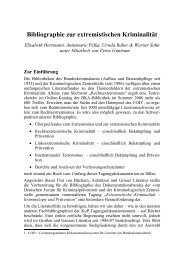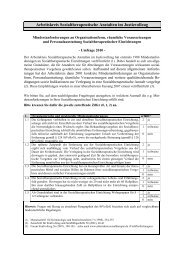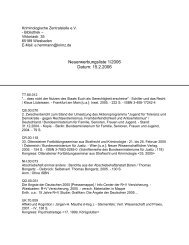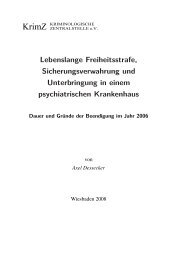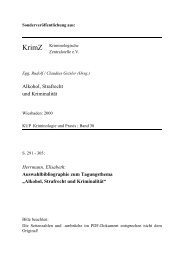Tätigkeitsbericht 2010 - Kriminologische Zentralstelle eV
Tätigkeitsbericht 2010 - Kriminologische Zentralstelle eV
Tätigkeitsbericht 2010 - Kriminologische Zentralstelle eV
Sie wollen auch ein ePaper? Erhöhen Sie die Reichweite Ihrer Titel.
YUMPU macht aus Druck-PDFs automatisch weboptimierte ePaper, die Google liebt.
Summary<br />
II. The Centre for Criminology: past and present<br />
1. History<br />
After twenty years of preliminary endeavours the <strong>Kriminologische</strong> <strong>Zentralstelle</strong><br />
(KrimZ – Centre for Criminology) started its work in 1986. The idea of<br />
establishing a Centre for Criminology in Germany was hatched in the late<br />
1960s. Apart from the development of criminology at the universities, the<br />
German federal states’ administrations of justice favoured a central institute,<br />
which passed a resolution to this effect in 1971 at a national conference of the<br />
Ministers and Senators of Justice, A binding agreement between the national<br />
government and the federal states could not be reached until the 1981 conference<br />
of the Ministers of Justice due to financial and organisational problems.<br />
Wiesbaden, the capital of Hesse, was designated as a permanent site. Therefore,<br />
further preparations as well as the financing of basic equipment were<br />
carried by the Hessian Ministry of Justice. After having determined the budget<br />
in 1985 and electing the board of directors in autumn of the same year, the<br />
foundations for starting business were laid. Organisational structures had to be<br />
defined and scientific; as well as non-scientific staff, had to be hired before<br />
the KrimZ could become fully operational in the spring of 1986.<br />
The German Reunification on 3 October 1990 brought an expansion of the<br />
working space. The new federal states in the east of the country were temporarily<br />
represented as guests before they became ordinary members of the<br />
KrimZ during the autumn conference of the Ministers of Justice on 4 November<br />
1993 in Leipzig.<br />
After ten years of work, the KrimZ was evaluated by a committee set up by the<br />
federal states’ Ministers of Finance. While the committee recommended to<br />
terminate funding the Prime Ministers of the federal states declared at their<br />
conference in October 1996 in Erfurt that the common funding of the KrimZ is<br />
essential due to its importance for criminological research and documentation.<br />
An additional evaluation of the KrimZ by a joint committee of the national<br />
conferences of the Ministers of Finance and Justice was formally settled by a<br />
final decision of the Prime Ministers of the federal states in October 2009.<br />
This decision established principles of the Centre‘s funding by the national<br />
government and the federal states that will be applied up to 2014.<br />
2. Organisation<br />
The KrimZ is a registered society according to German law, i.e. regular members<br />
of the institute are the Federal Republic of Germany and all the federal<br />
states. The Federal Republic holds 44 % and the remaining members 56 % of<br />
47


